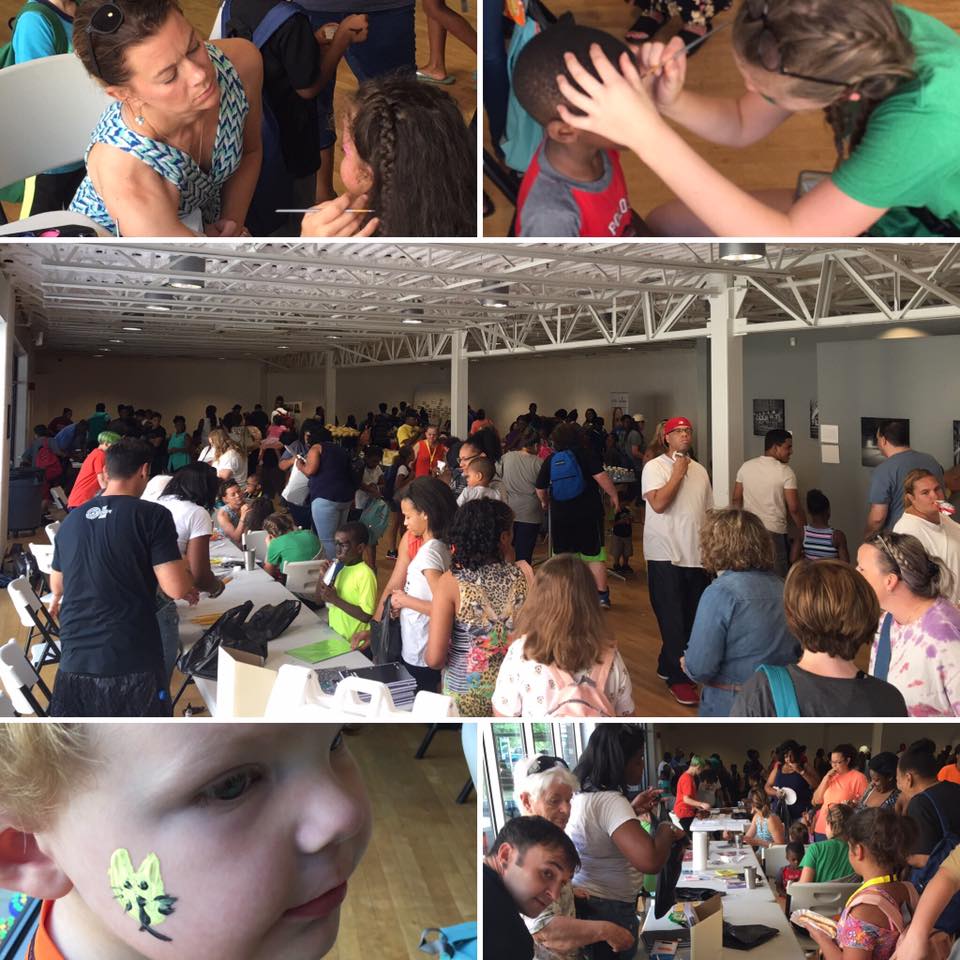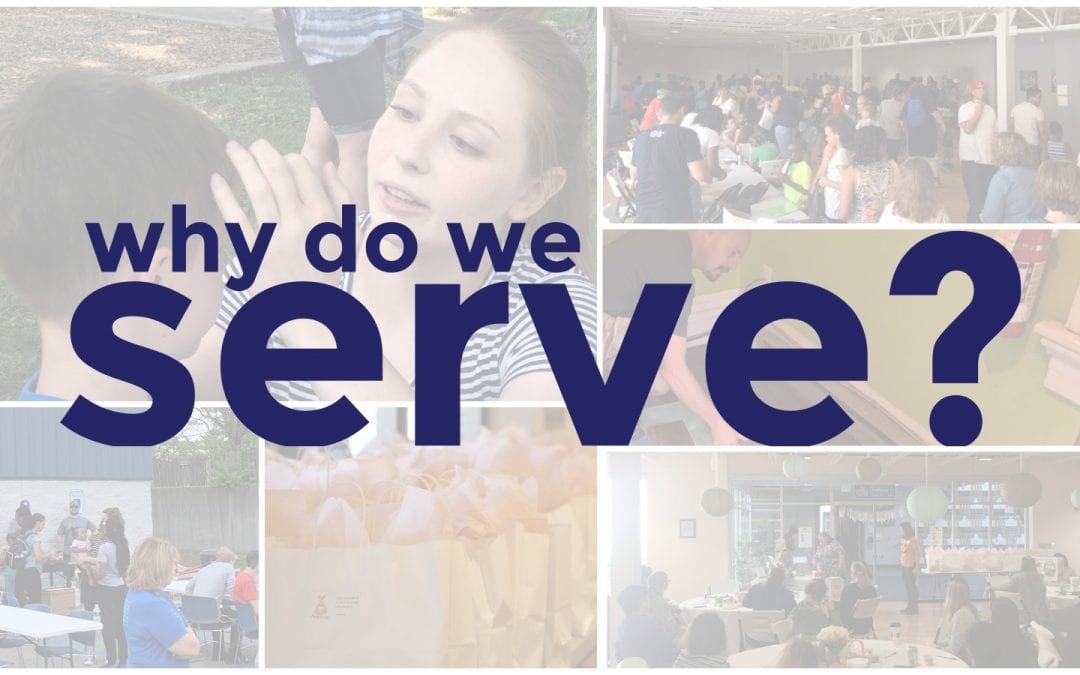Some questions seem so simple and obvious that they never really get asked. And after long periods of going unasked, their answers become assumed. As a result, these assumptions go unchallenged, unengaged, and over time, become distorted. One such question has popped into my mind of late, and I wanted to ask it: why do we serve?
With the last 3 months of the year approaching, there are new and important opportunities at Restoration to meeting tangible needs in our community. As we prepare to roll these opportunities out to the Church, I don’t just want to make it clear what we are doing – I want us to know our why.
From the beginning, serving those in need both inside and outside the walls of the Church has been central to our identity and calling. As our 3rd year as a Church approaches, it is humbling to know that we’ve developed a reputation as a community for being willing to step into places of need and impact in our neighborhood and beyond. We’ve almost never had to go looking for places to serve – opportunities come to us! To  be honest, there are more needs that are presented to us than our little church plant can handle. In each, we try and discern whether we have both capacity and calling to engage without losing the roots of where God already called us.
be honest, there are more needs that are presented to us than our little church plant can handle. In each, we try and discern whether we have both capacity and calling to engage without losing the roots of where God already called us.
So with the end of the year approaching and some big opportunities coming, I wanted to slow down and remember why we serve – to ask the question afresh and encourage us as we step into the places God calls us. But before we answer this question rightly, we need to confront some very wrong reasons why we serve in our community. Why? Because doing good things for the wrong reasons distorts God’s call and burns us out. I’ve seen it happen to many times. And in some cases, I’ve seen it happen to me. So – what are some of the wrong reasons to serve?
3 Terrible Reasons To Serve
To earn God’s approval. This may seem obvious, but I’ve heard it out of many people in some form or fashion – both implicitly or explicitly. Usually, we feel some sense of guilt, shame, or regret about our own spiritual lives, and to numb the pain and make ourselves feel better, we get out and serve. Internally, a scale tips back and forth, and a few good deeds might make up for a few bad ones, right?
Overtime, you begin to notice – the scales don’t budge. We still feel shame, guilt, and fear about how God sees us. So we either try harder… or fall away. In the end, the problem we face is at the heart of the Gospel. Our good behavior doesn’t impress God. By putting our faith in Jesus, the internal scale has been destroyed, and we have God’s acceptance and approval as a son or daughter of God not on the basis of the good or bad we do, but rather on grace. Here’s the truth – we serve from the approval God has already given us in Jesus, not for it.
Because Those People Need Us. This one is subtle, and like the attempt to earn God’s approval, we can dress this reasoning up in religious language and crusade into issues of poverty and justice like the heroes we think we are. We have resources, they don’t, right? This well intentioned, often-beneath-the-surface mentality pervades a great deal of ministry to those in need, and I’ve found myself unconsciously assuming this posture if I’m not intentional about my motives.
It’s well intentioned, but this mindset relies on false assumptions that are not only unbiblical, but offensive. First, we are not “bringing Jesus to these people.” Jesus is already present and at work among those we seek to serve. Second, all of the resources aren’t in our hands. The poor and marginalized are often rich in ways that we are very poor – like having a deeper, dependent faith, an interdependent community of care, and a perspective on God that is not blinded by privilege. We are paternalistic in our posture if we act otherwise. Here’s the truth – we need the poor and marginalized as much – if not more – than they will ever need us.
To Tackle “Issues” In The Community. When you drive through downtown Lexington, many pressing needs will come to light (if you want to see them). You’ll see the homeless population, panhandling or wandering through the streets of the city. You’ll see poverty impacting neighborhoods and populations in pockets spread all over Lexington. You’ll see men and women impacted by addiction. You’ll notice the racial disparities and continued separation or outright segregation in housing in our city. And so on. If you want to see it, it’s there.
And while you may be seeing issues, you’re likely not seeing people and their stories. You’re not seeing the PTSD that’s driven someone to the streets. You’re not seeing the parents who can’t find good work and therefore daycare for their kids because of felonies in their distant past. You’re not seeing the death of a parent that drove someone into addiction. The closer you get, the more complex stories become. Issues dissolve, people come to the forefront. Long story short, people don’t want to be treated as “projects” or “issues.” Here’s the truth – tackling “issues” and loving people where they are are two separate things. If you’re not in it for the relationship, for the presence, for the solidarity, then you’re in it for the wrong reasons.
What About The Right Reasons?
If we’re not gaining God’s approval, trying to be saviors to people who “need” us, or tackling big issues at the exclusion of actual people, why should we serve? What should drive us to meet people where they are and serve them? Let me give you a few why we do what we do.
It’s Where We Find Jesus. If you want to find Jesus, you’ll find him among the poor and marginalized. It’s not to say he’s not present in the lives of those of us with more wealth and resources, but the Bible makes it clear that Jesus is so deeply in solidarity with those in need that when we serve the poor and marginalized, we are serving him. Look in Matthew 25 at this stunning promise from Jesus: “‘For I was hungry and you gave me something to eat; I was thirsty and you gave me something to drink; I was a stranger and you took me in; I was naked and you clothed me; I was sick and you took care of me; I was in prison and you visited me.’ “Then the righteous will answer him, ‘Lord, when did we see you hungry and feed you, or thirsty and give you something to drink? When did we see you a stranger and take you in, or without clothes and clothe you? When did we see you sick, or in prison, and visit you?’ “And the King will answer them, ‘Truly I tell you, whatever you did for one of the least of these brothers and sisters of mine, you did for me (Matthew 25:35-40).”
This passage makes it clear – when we look into the face of those we serve in need, we are looking at Jesus.
It’s Shows The World Our Future In The Present. Jesus taught us to pray, “Your kingdom come, your will be done, on earth as it is in heaven (Matthew 6:10).” In other words, the life of heaven – the shalom of God, where nothing is missing and nothing is broken – is the reality we are called to live right here on earth. When we stand in the gap and bring restoration in relationships and neighborhoods, both in tangible and spiritual ways, we point to the reign of God here on earth. As a result, heaven becomes far more than a disembodied future – it becomes a present reality and pursuit among us.
It Is The Overflow Of The Love We’ve Received. The truth is, we can’t give what we’ve never received. 1 John 3:16-18 tells us, “This is how we know what love is: Jesus Christ laid down his life for us. And we ought to lay down our lives for our brothers and sisters. If anyone has material possessions and sees a brother or sister in need but has no pity on them, how can the love of God be in that person? Dear children, let us not love with words or speech but with actions and in truth (1 John 3:16-18).”
What is John telling us? If we’ve received the love of God in Jesus Christ, loving those in need will be the natural overflow of our lives. There are thousands of motivations to serve, but only one of these motivations can sustain us for the long haul – love. Paul reminds us that all of our frantic busyness and importance in serving is, well, meaningless without love: “If I give all I possess to the poor and give over my body to hardship that I may boast, but do not have love, I gain nothing (1 Corinthians 13:3).”
***
This fall, we’ll be painting faces, providing meals for hundreds of kids and families, serving and encouraging men overcoming addiction, handing out candy to kids in our neighborhood at Halloween, providing diaper bags and essentials for moms overcoming addiction, and making Christmas a reality for kids families impacted by that very same addiction. That’s a lot!
So before we start, let’s remember our why: the only why that can sustain us and empower us for generosity and service: love. May we receive it in Christ, and as we do, give it away freely to those God leads us to serve.

